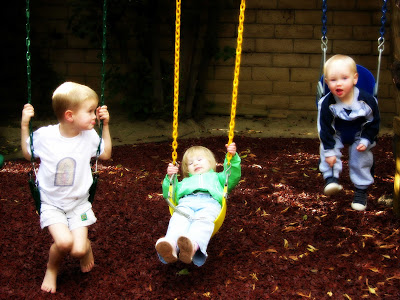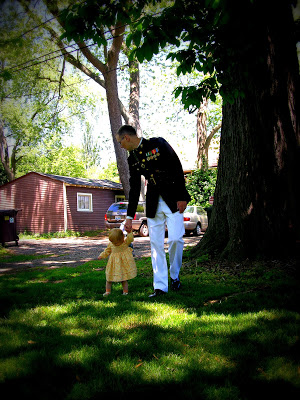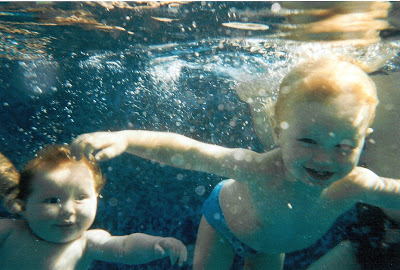For Tuesday’s post on WHY we practice Parenting With Authority, see here.
I started out to make a list of rules for Parenting with Authority. But it turned out that all the rules I wrote out just ended up coming back to one single concept: ALWAYS MEAN WHAT YOU SAY.
Period.
That’s the whole method. But it wouldn’t make for a very long blog post.
I want you to get your money’s worth. So let me flesh it out a bit for you.
First off, it works for every type of parent. Do you really, really want your kids to clear their dishes, or perhaps not run full speed into the parking lot because you’re too pregnant to catch them? Great. This will work for you. Just always mean what you say, especially about dishes and parking lots. Don’t mind if your kids eat pudding off their mittens?
Terrific.
You don’t have to say any things about that.
It’s just that easy. But in case you have become accustomed to my super-duper long posts, here come a lot more words . . .
1. ALWAYS MEAN WHAT YOU SAY: So when you say it’s time to leave the park, it IS actually time to leave the park.
If I say it’s time to leave the park, but then I don’t leave because the kids throw a fit or they “don’t hear me,” then my kids learn that I DO NOT always mean what I say. If they learn that they will ignore me and argue with me. I do not care for being ignored or argued with.

2. ALWAYS MEAN WHAT YOU SAY: And never lie to them. So I don’t say, “Nope, sorry, the crackers are all gone,” as I stash the rest of the crackers under the stroller. When what I mean is, “No sweetie, you may not have any more crackers. It’s okay to feel a little hungry, we’ll have dinner when we get home.” Or, “No, I brought those crackers for the baby. You’ll have to be a big girl and wait until we get to the car.” And that’s it. Mean what you say.
3. ALWAYS MEAN WHAT YOU SAY: And get up when necessary. If I told him not to, and he still is, I’m going to have to get
up. I get the concept well-ingrained in a toddler before the next baby comes along. It’s better not to start the process
when you’re nursing a newborn. Because a toddler will surely call your bluff.
4. ALWAYS MEAN WHAT YOU SAY: Even if they are sad or mad or loud.
Here’s a little play, by way of illustration.
You: (taking your sunglasses back from baby) No, no, those belong to Mommy.
Baby: WWWWWWWWAAAAAAAAHHHHHHHHH!!!!!!!
You: (giving your sunglasses back to baby) Okay, okay, sshhh, you can have them.
Baby: (addresses audience) Really, that’s all I have to do? That will not be a problem. THE WORLD IS MINE! <evil baby laugh>
Don’t let this happen to you.

5. ALWAYS MEAN WHAT YOU SAY: But obstinance is not a virtue.
The answer should be “O-K Mama” 90% of the time. I say 90% of the time, because probably 10% of the time, they do have relevant information to share, and it will change my mind. That’s not the same as not meaning what you say. When I say something to my children, more often than not, they say something back. I begin by listening carefully, but if it’s just a bunch of nonsense that’s only going to waste everyone’s time, I don’t feel bad about cutting them off with an “O-K Mama” to remind them of the preferred response.
If they DO have new information, I can change my mind. I am always sure to be clear about why I am changing my mind, and to point out that it was only possible because the child presented his case calmly and without crying. I have a personal policy against changing my mind if my kids are whiny, even if they are also right.
6. ALWAYS MEAN WHAT YOU SAY: And have rules and keep them.
Established rules create comfort and clarity in a home. Without them, everything is up for discussion. And by “discussion” I mean whining, pestering, and finagling. For instance, in our house kids are allowed to play Wii under the following conditions (for more on this topic see here):
- Done with schoolwork, chores, and practices.
- Someone has agreed to play with you.
- It is dark, or raining, or over 100 degrees, or a Sunday.
So, when they ask me if they can play Wii, I can turn it around and ask them if they can. If they haven’t met the conditions, they can’t play. There’s no confusion so there’s no incentive to whine or pester or finagle.
I try to have set rules that explain how we’ll accomplish all of our routine activities. But they only work if I only very rarely bend or break them.
7. ALWAYS MEAN WHAT YOU SAY: But you don’t have to be a bully about it.
Hey, I married a Marine, so my kids get the concept of following orders, immediately and without question. But in practice they respond much better to, “Let’s gather up all the library books and get going, the library closes early today,” than they do to, “Stop reading that and put it in this bag.” Being consistent doesn’t mean being unpleasant. And yelling isn’t going to be effective if you don’t actually mean it, and if you DO mean it, you probably don’t have to yell (much).

8. ALWAYS MEAN WHAT YOU SAY: Give clear consequences and then follow through with them. So I don’t say, “If you leave your clothes in the bathroom again I will make a big pile of all your clothes and light them on fire.” Since I probably won’t do that. I DO say, “If you kick the counter again, you will stand for the rest of lunch.” Then I follow through if necessary. Be calm but firm. Don’t get mad. Just mean what you say.
For excellent advice on particularly effective punishments, I like Discipline That Lasts a Lifetime by Dr. Ray Guarendi. Dr. Ray really focuses on the concept of consequences for kids, and the book is funny and charming.
9. ALWAYS MEAN WHAT YOU SAY: And as far as I know you don’t have a crystal ball. I don’t ever get pressured into promising something that I can’t necessarily deliver. I won’t make promises about anything in the future: be it what they will have for snack when they wake up or whether they can do a particular craft after their school work is done. Because I don’t know the future. Say I tell my kids we can do a craft as soon as we’ve all finished our math lessons. What if IT TAKES THEM SOOOO LONG TO FINISH that Jesus comes back before we’re done? I would hate for my kids’ last earthly thought to be, “Hey, she said we could make play dough.”
I will take a quick moment here to say that always meaning what you say doesn’t mean that life doesn’t sometimes get in the way. Plans do change. Kids need to be able to learn to handle disappointment and control their emotions.
I never promise to “make it up” to them, or say they can go next time for sure, because I don’t know what’s going to be happening next time. In fact I never say “I promise” to them at all. It’s right there in the sermon on the mount: “But I say to you, Do not swear at all, either by heaven, for it is the throne of God, or by the earth, for it is his footstool, or by Jerusalem, for it is the city of the great King. And do not swear by your head, for you cannot make one hair white or black. Let your word be ‘Yes, Yes’ or ‘No, No’; anything more than this comes from the evil one.” (Matthew 5:34-37)
I happen to think “We’ll see, We’ll see” is okay too.

10. ALWAYS MEAN WHAT YOU SAY: And convince them that resistance is futile. I have no idea if this is true, and Google wasn’t particularly helpful when I tried to figure it out, but let’s just pretend it’s true, for argument’s sake. I heard once that if you have two aggressive fish in a tank, you can put a clear divider in there and the fish will throw themselves at it and try to attack each other for a while. But eventually, they will decide it’s not possible to get through. Then you can remove the divider and they’ll just each stay happily on their own side, because they are convinced that they won’t be able to get through.
That’s the goal of Parenting With Authority. If your kids are utterly convinced that you ALWAYS MEAN WHAT YOU SAY, then why in the world would they bother to not listen to you? They know it won’t work. And they know they’ll just get in trouble.
But if sometimes you mean what you say, but mostly you give in, (especially if you give in because your child is sad or mad or loud) all you do is teach them that being sad or mad or loud is the way to accomplish things. You force them to be unhappy so that they can get what they think they want. BUT, if being sad is NEVER an effective way to get what they think they want, children quickly realize that they might as well be happy.
I wouldn’t want to be a person whose kids listen to their teachers and coaches and tutors, but don’t listen to me, because I do NOT always mean what I say.
My kids are still often lazy, or selfish, or forgetful, or even argumentative, but they are almost never willfully disobedient. Because they are at least as smart as fish.



